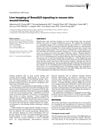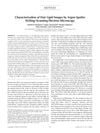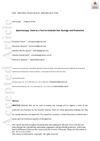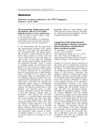 15 citations,
October 2017 in “Journal of Cosmetic and Laser Therapy”
15 citations,
October 2017 in “Journal of Cosmetic and Laser Therapy” FDA-cleared devices may help treat hair loss, but more research needed; consult dermatologist before use.
 15 citations,
May 2017 in “Lasers in Medical Science”
15 citations,
May 2017 in “Lasers in Medical Science” Low-level laser treatment helps mice grow hair by increasing certain protein levels linked to hair growth.
 15 citations,
February 2014 in “BMC Research Notes”
15 citations,
February 2014 in “BMC Research Notes” The X5 Hairlaser might help treat male hair loss, but more research is needed.
 14 citations,
May 2011 in “Facial Plastic Surgery Clinics of North America”
14 citations,
May 2011 in “Facial Plastic Surgery Clinics of North America” Laser hair removal is effective for dark hair but needs improvement for nonpigmented or fine hairs.
 12 citations,
October 2012 in “Dermatologic Clinics”
12 citations,
October 2012 in “Dermatologic Clinics” Low-Level Laser Therapy and other light treatments for hair growth lack strong evidence and need more research.
 12 citations,
September 2007 in “Wound repair and regeneration”
12 citations,
September 2007 in “Wound repair and regeneration” Smad2/3-dependent TGF-β signaling increases during wound healing.
 12 citations,
February 2006 in “Lipids”
12 citations,
February 2006 in “Lipids” Hair texture changes with age due to varying levels of lipids.
 12 citations,
June 2003 in “Journal of the European Academy of Dermatology and Venereology”
12 citations,
June 2003 in “Journal of the European Academy of Dermatology and Venereology” Some psychoactive drugs can cause skin reactions, with carbamazepine having a higher risk, and stopping the drug and seeing a dermatologist is important.
 12 citations,
November 1970 in “Postgraduate Medical Journal”
12 citations,
November 1970 in “Postgraduate Medical Journal” Some skin diseases and anaemia are related, and treating the skin condition can often improve the anaemia.
 7 citations,
March 2019 in “Medicine”
7 citations,
March 2019 in “Medicine” Combining light therapy and microneedling shows promise for treating female hair loss.
 3 citations,
November 2022 in “Frontiers in molecular biosciences”
3 citations,
November 2022 in “Frontiers in molecular biosciences” Plasmalogens activate a channel in cells that may stimulate hair growth.
 2 citations,
November 2018 in “International Journal of Cosmetic Science”
2 citations,
November 2018 in “International Journal of Cosmetic Science” Chamomile extract can protect hair from damage caused by light.
 2 citations,
December 2017 in “Bangladesh Journal of Pharmacology”
2 citations,
December 2017 in “Bangladesh Journal of Pharmacology” Black seed oil significantly protects against hair loss from chemotherapy.
 2 citations,
September 2004 in “International Journal of Cosmetic Science”
2 citations,
September 2004 in “International Journal of Cosmetic Science” Hair quality is genetically determined and linked to its composition and strength.
 1 citations,
December 2021 in “Pakistan biomedical journal”
1 citations,
December 2021 in “Pakistan biomedical journal” Eating certain seeds may help reduce symptoms of Polycystic Ovary Syndrome.

research Hair
1 citations,
January 2016 in “Springer briefs in molecular science” The document suggests using safer, plant-based hair products instead of harmful synthetic ones.
1 citations,
May 1983 in “Acta dermato-venereologica” The hairpiece matted due to weathered hair after shampooing.

PCOS patients, especially obese ones, often lack vitamin D and may need supplements and lifestyle changes.
 June 2024 in “International journal of nanomedicine”
June 2024 in “International journal of nanomedicine” Azelaic acid micro/nanocrystals, especially with ultrasound and salicylic acid, greatly improve acne treatment.
 April 2024 in “Lasers in medical science”
April 2024 in “Lasers in medical science” Near-infrared LED light improves skin rejuvenation and hair growth better than white LED light.
 January 2024 in “Theranostics”
January 2024 in “Theranostics” Exosomes from special stem cells help treat ulcerative colitis by reducing inflammation and stress.
 December 2023 in “International journal of research in dermatology”
December 2023 in “International journal of research in dermatology” The ayurvedic hair oil is safe and effective for reducing hair fall, promoting hair growth, and improving scalp health.
 September 2023 in “Asian journal of beauty & cosmetology”
September 2023 in “Asian journal of beauty & cosmetology” Lipids are important for healthy hair, but their exact role is not fully understood and needs more research.
 September 2023 in “Scientific reports”
September 2023 in “Scientific reports” Segmental hair analysis can track testosterone over time but needs adjustments for sex, hair color, and washing frequency.
 July 2023 in “International journal of pharmacognosy and life science”
July 2023 in “International journal of pharmacognosy and life science” The herbal hair oil made from various plants might be a good alternative to synthetic hair loss treatments.
 April 2023 in “International journal of research in Ayurveda and pharmacy”
April 2023 in “International journal of research in Ayurveda and pharmacy” Ayurvedic treatment improved symptoms and reduced TSH levels in a hypothyroidism patient.
 July 2022 in “Research Square (Research Square)”
July 2022 in “Research Square (Research Square)” Hair analysis can somewhat track past testosterone levels but is influenced by factors like hair washing, growth rate, sex, and hair color.
 January 2022 in “International journal of pharmaceutical sciences review and research”
January 2022 in “International journal of pharmaceutical sciences review and research” Herbal cosmetics are becoming more popular because they are safer, have fewer side effects, and offer health benefits.
 June 2020 in “Journal of Dermatological Treatment”
June 2020 in “Journal of Dermatological Treatment” Use telemedicine and strict hygiene for safe hair and scalp treatments during COVID-19.
 January 2020 in “Asian Journal of Basic Science & Research”
January 2020 in “Asian Journal of Basic Science & Research” Nutrease powder, a high-protein, low-carb supplement, can help manage Polycystic Ovary Syndrome symptoms, regulate periods, improve ovulation, and restore fertility.





























